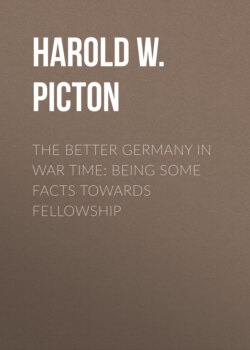Читать книгу The Better Germany in War Time: Being Some Facts Towards Fellowship - Harold W. Picton - Страница 12
На сайте Литреса книга снята с продажи.
Gœttingen.
ОглавлениеTable of Contents
Mr. Page himself reports on Göttingen, where there were about 6,000 prisoners. “The Camp Commandant, Colonel Bogen, has done everything possible to make this a model camp, and he has accomplished a great work. The only complaint is as to the food, the quantity of which, of course, is not under the control of the Commandant, as he is limited to an expenditure of only 60 pfennigs (about 7d.) per day per man.
“Everything was in the most beautiful order. There was a very fine steam laundry and drying room, bath rooms, with hot and cold showers, and the closets, etc., are in a very good condition and scientifically built. There is running water and electricity in the camp. A French barrister of Arras, named Léon Paillet, who was working with the French Red Cross and who, for some reason or other, has been made a prisoner, has done marvellous work in organising libraries, etc.
“I am pleased to say that the professors and pastors in Göttingen have, from the first, taken an interest in this camp, and Professor Stange has done much in helping the lot of the prisoners. The Y.M.C.A. building, erected through the efforts of Mr. A. C. Harte, who for a number of years has been working with the Y.M.C.A. in India, will be a great help to the men in the camp.
“At the opening ceremonies there were speeches by Colonel Bogen, Mr. Harte, and Professor Stange, and then each speech was delivered in English and French by prisoners. These were followed by short speeches by French, English, and Belgian prisoners. Then came a concert by the camp orchestra and the camp singing society, followed by songs and recitations by various prisoners.”
Dr. Ohnesorg reported further on April 22. At that time there were 6,577 prisoners, of whom 1,586 were British. He warmly commends the steam laundry, the steam disinfecting plant, and the hospital. “A spirit of contentment pervaded the camp. The British prisoners were well clothed. I tasted the evening meal, consisting of a vegetable soup, which was very palatable and, I should say, nourishing. … The citizens of Göttingen have taken a great interest in the camp, and some of them, notably Professor Stange, of the University, have given a great deal of their time to the welfare of prisoners and the formation of classes for study amongst them.”
